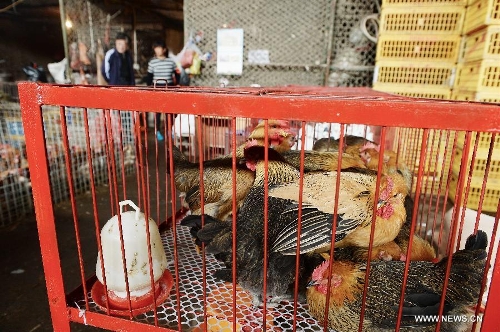HOME >> SOURCE
China moves to increase US agriculture goods to assuage phase one deal concerns
Source:Global Times Published: 2020/2/16 14:43:40

Live chickens are on sale at a market in Shanghai, east China, May 1, 2014. Shanghai resumed the live poultry trade starting from Thursday. (Xinhua/Lai Xinlin)
China on Saturday moved again to pave the way for increasing the purchasing of agricultural products from the US by lifting a ban on American poultry products.
The move is to assuage concerns over the implementation of the phase one trade deal between the two countries as the outbreak of the deadly coronavirus has clouded it.
After a series of risk assessments, China decided to further allow the import of poultry products from the US that meet China's laws and regulations, a statement from China's General Administration of Customs said on Saturday.
The effort is believed to be an extension of a decision in November 2019 to lift a nearly five-year ban on US poultry meat, which, experts say, is conducive to China's rising shopping of US agricultural products as agreed in the phase one deal and also to meet a growing demand in the domestic market.
"To further expand poultry imports from the US is in line with both the phase one trade deal and the domestic market demand," said Jiao Shanwei, editor-in-chief of cngrain.com, a website specializing in grain news.
In the phase one trade deal signed last month, China agreed to increase imports of US agricultural and other goods by about $200 billion over the next two years. But as the country continues to battle the coronavirus epidemic that has brought the country to a near standstill, many people have raised concerns about China's willingness and ability to meet that goal.
Chinese officials and analysts have maintained that China will be able to fulfill its commitment once the epidemic is over and has so far refrained from revoking a disaster clause in the agreement to consult with US officials.
Chinese Foreign Minister Wang Yi said in an interview with Reuters over the weekend that China will honor its promises. "Whatever we have agreed to, we will make it happen," said Wang, adding that China's massive market will rebound after the epidemic ends.
Wang said that the US is now bringing in new difficulties to the implementation of the agreement by comprehensively restricting bilateral personnel exchanges, and he stressed that the US should consider how to avoid unnecessary trade and personnel restrictions along with the WHO's recommendation.
"China will keep its promises in the phase one trade deal, and the US should fulfill its part too," Wang said.
There is also an immediate growing demand in China for poultry imports as the poultry breeding sector in China has been taking a hit by the outbreak of novel coronavirus pneumonia (COVID-19) due to transport cutting-off and fodder shortage, Jiao said.
Nearly every part of the industry chain has been impacted under such conditions and may further push up the meat prices, according to Jiao.
Expanding imports could relieve pressure on the supply side to some extent, but the urgent task is to contain the virus and resume production as soon as possible because China's meat consumption primarily depends on domestic supply.
China had seen surging pork prices brought about by the African swine fever (ASF) in 2019, and has been rolling out measures to assist farmers to resume production while expanding imports of meat to help increase supply, including pork, beef and poultry.
In November 2019, the country removed some restrictions on US poultry imports after a nearly five-year ban due to the outbreak of the bird flu, according to media reports.
According to data from the General Administration of Customs, China imported 2.1 million tons of pork in 2019, which surged 75 percent year-on-year.
Global Times
RELATED ARTICLES:
Posted in: INDUSTRIES,ECONOMY